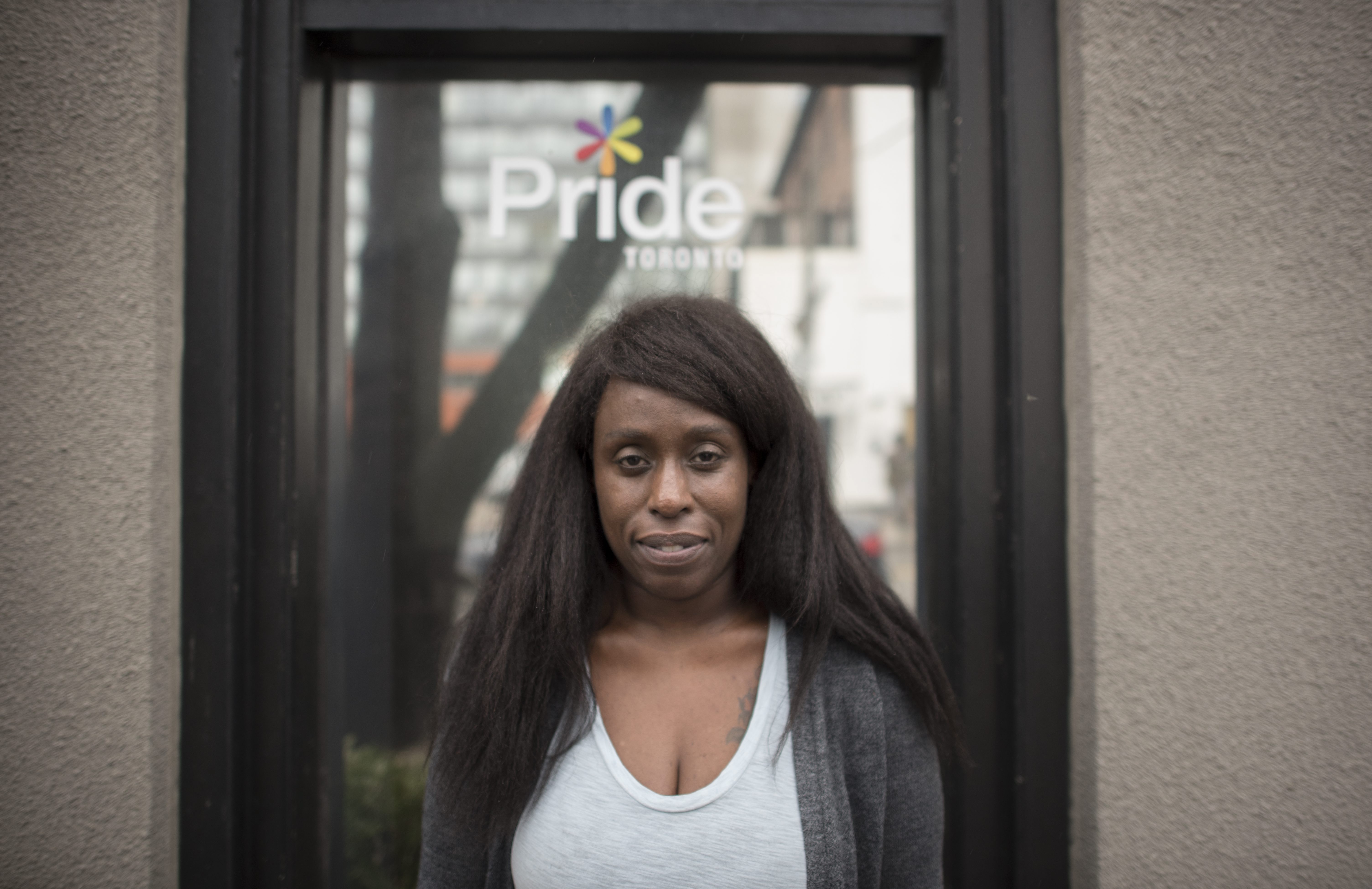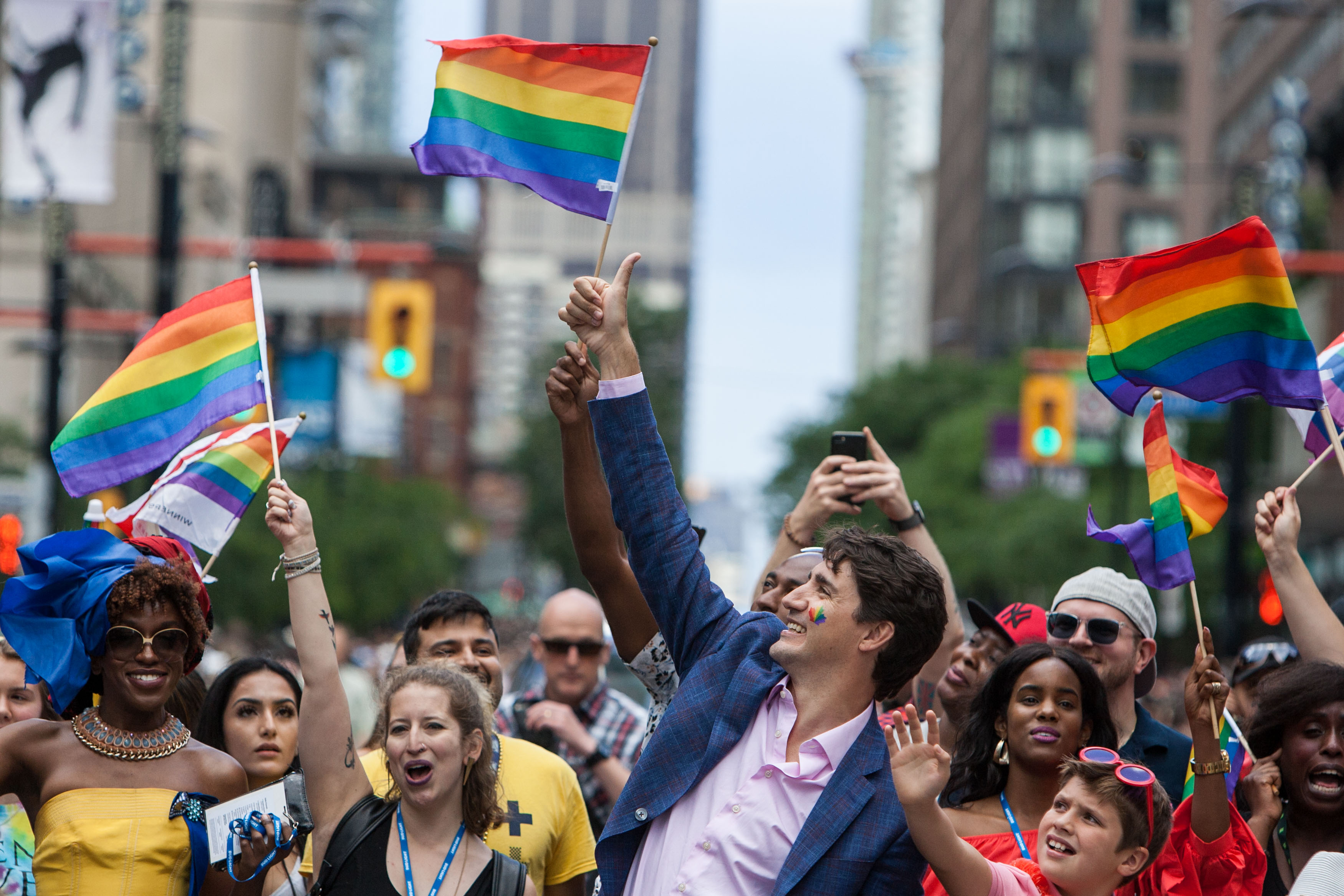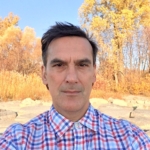Pride Toronto, one of the world’s biggest Pride organizations, announced the departure of its executive director, Olivia Nuamah, last week. Pride communicated the news in a tweet days after Nuamah left the job.
Nuamah served as the organization’s executive director since 2017 and was the first Black woman to hold that position. Her time with Pride Toronto was marked by controversy. In late 2018, despite calls to the contrary—particularly from Black, Indigenous and queer and trans people of colour, including Black Lives Matter Toronto—Pride Toronto agreed to re-allow uniformed police to march in the parade, which was overturned last year. And at last year’s Pride, the organization faced backlash for posting a land acknowledgment that failed to recognize any Indigenous peoples, or to treaties that Toronto falls under. On Twitter, Pride Toronto pushed back against this criticism before issuing an apology.
Nuamah’s departure raises a larger question for Pride Toronto: What is next for the organization, and how can it continue to serve the communities it seeks to celebrate?
Xtra editors Gordon Bowness, Erica Lenti and Arvin Joaquin weigh in on Nuamah’s tenure, Pride parades and the celebration of LGBTQ2 peoples’ identities.
Arvin Joaquin: Pride Toronto’s tweet almost a week after Nuamah’s last day on the job was interesting. The announcement was abrupt and left us with more questions than answers. However, with Pride Toronto’s history of secrecy in recent years—the organization stopped allowing media coverage of its annual general meeting since 2018—I’m not surprised.
It’s disheartening to see the lack of transparency from an organization that in its history was meant to celebrate the multitude of identities within our communities with unapologetic openness and irreverence about social norms. I’d argue that in recent years, most Pride celebrations were geared more toward making money—we see this in the presence of corporations who truly and suddenly turn gay during Pride season, some even go the extra mile and produce questionable advertising campaigns just to get those queer dollars. The media coverage of the parade, at least from what I’ve observed in Toronto, is geared more towards the mainstream heterosexual audience—it’s a superficial narrative that says: “Hey straight people, look at the gays! The rainbows! Look at them having fun!”
Perhaps, Pride Toronto, just like some other Pride celebrations, suffered in finding the right balance between celebrating the rich history of Pride and trying to keep the organization afloat.
Erica Lenti: Ah, yes—who could forget Cottonelle’s memorable Pride ads? Happy Pride, wash your genitals!
Gordon Bowness : Is making money really a bad thing, though? I’m all for queer and trans folk making money. If DJs, drag queens, performers, party promoters, clothing designers, candle-makers, sex trade workers—whomever—can make a buck during Pride, fantastic. It’s the large corporations that we have to be wary of, and their relentless, often insensitive commercialism.
EL: Absolutely, Gordon. I think that speaks to the greater nature of these massive Pride festivals. Pride Toronto has become a bit of a conundrum over the years: To have one of the largest Pride festivals in the world means the city is, for the most part, queer-friendly and accepting and supportive of LGBTQ2 communities in a way that a lot of the world isn’t. (Yes, even our politicians march.) It also means wrestling with the challenges that come with having a massive Pride celebration. What once began as a small grassroots gathering of queers is now a highly corporatized downtown party for all. Some say it’s too celebratory; others say it’s still too political. There’s no way to serve the needs and desires of every LGBTQ2 person in the city when you’re throwing a festival with an expected million attendees.
So, that said: No matter your personal feelings about Olivia Nuamah, her job was always going to be one in which she let people down. She—and anyone that’s been in the executive director role—could never appease everyone. And I don’t envy anyone taking on that job.

Olivia Nuamah, Executive Director of Pride Toronto, is photographed in the group's downtown Toronto offices on April 4, 2017. (Fred Lum/The Globe and Mail) Credit: Fred Lum/The Globe and Mail
AJ: Erica, that’s a great point. The executive director position is a complicated role—you eventually have to say yes and no to certain members of the community. For example, saying yes to corporate stakeholders may mean saying no to everyday folks. If the issue is the scale of the event, such as is the case with Pride Toronto, then I wonder how communities can dial down and truly tap into the real reason why we celebrate Pride in the first place. Sure, visibility is important, but I’d argue that we already get some of the world to see and listen to us—of course, there’s an opportunity to do better, but we see an increase in the representation of LGBTQ2 people in films and TV, and even openly queer politicians. I think it’s about time to really put nuanced issues that affect the LGBTQ2 community to the forefront—like the alarming rate of homelessness among LGBTQ2 youth, the health of bisexual folks, and the violence against the trans community. Perhaps, this can be achieved by dialling down the scope and really returning into Pride’s grassroots origins.
GB: I think of places like Buddies in Bad Times Theatre, The 519 community centre or the Gladstone Hotel, these incredible community hubs. There’s a reason why they offer so much programming around Pride. Scale matters; bringing in the punters, matters. I don’t think Pride should be faulted for focusing on numbers. But what numbers..? That might be the issue: The size of the parade, the number of tourists crammed into the festival site or all the other stuff that happens in the city? Sure, there might be limits. Bigger isn’t always better, especially at the levels Pride has grown into. Growth for the sake of growth is wrong-headed. It’s what we do with those numbers, how we influence debates in this city and beyond. We need to keep asking: Who benefits?
AJ: Exactly, I think healthy debates are important. However, what’s happening in Pride Toronto is not an isolated case. We’ve seen it happening in other Pride organizations and celebrations as well.
EL: When you look at what smaller towns across Canada, for instance, are doing with their Pride celebrations, something about them just feels so much more…wholesome. It’s very back-to-the-basics celebrating: Flag raisings, small parades, marches, mixers. There aren’t massive banks or alcohol companies advertising with floats or sponsoring beer gardens. The purpose of these events is to offer a space to represent marginalized communities. And in places where queer and trans acceptance perhaps isn’t as all-encompassing as it can feel here in Toronto, Pride parades can mean everything to queer and trans citizens. There’s something really nice about the simplicity of it all.
I, of course, can’t speak to what Pride in Toronto was like before it became the massive entity it is today, because, well, I wasn’t alive. But I like to think that it was something like those small-town prides—a show of celebration for queer and trans folks that wasn’t marred by big banks and beer gardens.
But I’m also a cynic and a pessimist. So, maybe I just don’t celebrate Pride—corporate or not—the right way.
AJ: Erica, I’m with you on this. I think Pride is important (and truly, some Conservative politicians, Peter MacKay, would agree), but I’m also part of the generation that’s seen Pride more as a celebration than activism. I remember the first time my friends and I celebrated Pride, we were more concerned about securing a table at a Vancouver gay bar than truly discerning why we were there and what warranted us the freedom to do that in the first place. Of course, we all grew up and learned the importance. But I feel like, in recent years, the celebration becomes shallower and more disingenuous…but then again, I’m also a cynic.

GB: I love Pride. I am, ahem, a gay man of a certain age (side-eye EL… I don’t know how to do emojis ;-). And to me, Pride was never “wholesome.” I don’t think my perspective is generational, however. Queers have been fighting over Pride, its personal and political relevance, since it began. You make of it what you want. I’ve been going most of my adult life. In fact, my boyfriend and I have been storming the parade, running through it in ridiculous costumes, each of the 17 years we’ve been together. I love the spirit of Pride. There’s still something amazing that happens when we LGBTQ2 folk get together in big numbers. Do you know how rare it is to see queers smiling at each other?
EL: 👀
AJ: Gordon, that’s how you do emojis. Also, what do you mean? Queer people smiling at each other is rare? But jokes aside, it’s great to celebrate Pride. However, we also reached the point that it’s so easy to confuse the spirit of annual Pride celebrations with that of Pride as an organization.
GB: I love the spirit of Pride, as a concept. But I’m no apologist for Pride Toronto as an organization. I think how Pride has screwed over Blackness Yes! in the past by constantly shifting the location of its popular Blockorama party, or the horrible backtrack that happened after BLMTO stopped the parade in 2016 to issue an important set of political demands… there are so many things that Pride Toronto as an organization has done wrong.
EL: And since Nuamah’s departure, it’s worth noting just how many concerns have been raised by Pride volunteers and community members about the current state of the organization. On Jan. 23, current and former Pride Toronto members and volunteers penned an open letter calling on the organization’s board of directors to address the lack of transparency around membership and Nuamah’s exit. A few days later, No Pride in Policing—an organization born out of BLMTO’s protest and demands in 2016—called on Pride Toronto to make violence against LGBTQ Black, Indigenous and people of colour the organization’s number-one priority.
It seems there are issues to the very foundation of Pride Toronto—and likely major urban Prides around the world—that need to be addressed before we move forward at all. I think in order for Pride to be the best it can be for as many community members as possible, we need to accept that it has done a lot of good—and has a lot of room to improve.
GB: For all its problems, let’s not forget Pride has done so many things right: it was a crucial site of pain, protest and joy during the height of the AIDS crisis; it was an early adopter—granted after much community agitation—of a more expansive expression of queer Pride by adding the Dyke March in 1996 and the Trans March in 2009; it has increasingly focussed a spotlight on international struggles; and it continues to play a critical role in reshaping public opinion in this city and beyond.
EL: It will always be a massive fixture in our city, absolutely. But it also needs to grow with the city.
AJ: I’m wondering what comes next for Pride Toronto especially with all the mystery that shrouded Nuamah’s departure that even volunteers were concerned about the details? But most importantly, I’m wondering what’s next for Pride?
GB: I’d be very sad if Pride as an organization collapsed. It is a critical component of this city. No matter what, though, I still expect hundreds of thousands of queer and trans folk to be partying in the streets and fighting the good fight every summer. After all, DIY-activism and socializing have always been the beating heart of Pride.
EL: Amen to that.




 Why you can trust Xtra
Why you can trust Xtra


